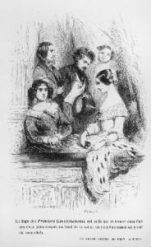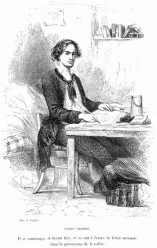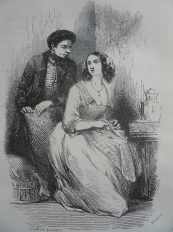
Lost Illusions (Episode 1)
THE HUMAN COMEDY – Honoré de Balzac Eighth volume of works of Honoré de Balzac edited by widow André Houssiaux, publisher, Hebert and Co, successors, 7 rue Perronet – Paris (1877) Scenes from provincial life

Madame de Bargeton
THE LOST ILLUSIONS – Episode I The two poets – Scenes from provincial life
Analysis of the work The Two Poets is the first part of Honoré de Balzac’s monumental workLost Illusions. Illusions perdues has become the title of one of Balzac’s best-known series of novels, recounting the early life of Lucien de Rubempré in three successive novels. But before taking on the title of this trilogy of novels, Illusions perdues was first and foremost the title of the first part of the triptych, which takes place in Angoulême and ends with Lucien de Rubempré’s arrival in Paris. The first thing to remember is this: for readers of Balzac, there were three novels, Lost illusions published in February 1837 by Werdet, then A great man from the provinces in Paris published in May 1839, finally David Séchard or the inventor’s sufferings published in June-July 1843, each featuring the same main characters and recounting Lucien de Rubempré’s early life. And it was only in 1844, in the general edition of La Comédie humaine, that these three novels were presented together in a single volume under the common titleIllusions perdues. These explanations are necessary if we are to understand the true character of Balzac’s great novels, which are not, as is sometimes believed, novels that came from a single stream and were published all at once, but are often sets of novels, “trains” of novels, so to speak, whose publication depends on circumstances. This was the case with Béatrix, previously published in our collection, and would later be the case with Splendeurs et misères des courtisanes and l’histoire des treize. This first episode ofLost Illusions, to which Balzac much later gave its present title: Lost Illusions, Part One: The Two Poets , was first and foremost a novel of provincial life, begun in June 1836 and published in February 1837. A note in Balzac’s manuscript sums it up: “David and Eve (Lucien’s sister and brother-in-law) lose their illusions about Lucien. Mme de Bargeton (she’s Lucien’s protector) ditto. Lucien on Mme de Bargeton.” The triple disillusionment thus described corresponds well to the original title. Written during the same dramatic crisis described above for La Vieille Fille, Lost Illusions should be, in principle, as The Cabinet of Antiquesa short story, basically dealing with the same subject as The Cabinet of Antiqueswith the same character, a spoiled child, well-talented, attractive, but weak, vain, fickle, chosen from a different background and under different circumstances, but destined for the same fate. The novel’s subject is summed up by Balzac: “A young man who believes himself to be a great poet and the woman who keeps him in that belief and throws him into the middle of Paris poor and unprotected.” The tone of irony towards the province is the same in both cases. But instead of being tinged with nostalgia and tenderness, it’s freer and more comic in Lost Illusions. Balzac knew Angoulême through his friends Carraud, who were sent in disgrace to the Poudrerie d’Angoulême in 1831. Through them, he had heard of this Rosa de Saint-Surin who had a salon in Angoulême: “a woman author,” Zulma Carraud wrote to him, “an artist, often dressed in Greek style” and that Mme Suzanne Bérard, who devoted her thesis to this woman, had written to him. Lost illusions looks on Mme de Bargeton, Lucien de Rubempré’s protector, as her principal model.

Lucien Chardon
Madame de Saint-Surin’s velvet beret and turban must have made a strong impression on Balzac, since he used them again to imagine La Muse du Département. The noblesse he has placed around her form a picturesque gallery for which Balzac probably drew on other memories. The ignorance and stupidity of this society of hobgoblins is the best part of this prologue. The evening of Lucien’s performance before this areopagus, the mannerisms and pretensions of the attendees, their reflections as Lucien reads Chénier’s poems to them, their silliness and nastiness, is one of the most successful pages in Scènes de la vie de province. The admirable stupid and mute husband who so intimidates the young man, the petty maneuvers of the bastards, the originals who thrive like exotic plants in this provincial hothouse – it’s an opera buffa of marvelous richness and variety, in which Balzac amuses himself as much as his future reader. This provincial comedy was completed in the original version of this first episode by the exhibition of Lucien and Mme de Bargeton on their arrival in Paris, which Balzac later placed in his second episode. This disastrous, comic denouement, Lucien’s complete abandonment on the capital’s cobblestones, gave this first part a satirical illumination and a cruelty that is missing from the fore-scene, whose definitive breakdown Balzac would much later fix.
The Story Set during the Restoration This is the shortest part. It is located in Angoulême. David Séchard, the son of a printer, forms a close friendship with Lucien Chardon, a handsome, literate young man. David’s father (the type of miser who rejects the passing of generations) sells his printing business to his son on very unfavorable terms (three times its value). David, who has little taste for business, is close to ruin. However, he manages to survive thanks to the devotion and love of his wife, Eve, who is Lucien’s sister. In secret, he was looking for a process to produce paper at lower cost and with higher quality. Lucien befriended a noblewoman, Madame de Bargeton, who saw in him a great talent for poetry: he saw her as his Laure and, in imitation of Petrarch, dedicated a collection of sonnets to her. She introduces him to her society and falls in love with him. This unconsummated love between a radiant young man and an older married woman fits perfectly into the medieval scheme of courtly love, about which the hero has great illusions, more or less consciously, illusions that he will later lose, hence the title Lost illusions. Lucien finally fled with his protector to Paris, to make a career there.

Eve and David Séchard
Main characters Lucien Chardon: Poet, man of letters and brother of Eve Chardon; Lucien is the son of Mr. Chardon, a pharmacist in l’Houmeau, whose mother is of noble birth. She’s a de Rubempré. He hates his father’s name, which hinders his hopes and plans. Through the intermediary of his noble friends (in fact his enemies), he tried to obtain the Rubempré name from the King, but to no avail. It wasn’t until much later, in Splendeurs et misères des courtisanes, that we found Lucien, for whom the Rubempré name had been rehabilitated. Eve Chardon: Lucien’s sister and wife of David Séchard, a printer in l’Houmeau, Eve Chardon is a very pretty young woman. She has her brother’s physical beauty, with the added constancy and willpower her brother lacks. She idolizes Lucien and believes he has all the qualities she lacks. She predestined him for a destiny in the literary world. She will bleed to death to support her brother’s exaggerated needs and whims. David Séchard: A printer in l’Houmeau, friend of Lucien and husband of Eve Chardon, David, like his stingy, unsentimental father, is a kind and generous man. He too believes in his friend Lucien’s success. Considering the latter as his brother, he helped him financially in his early days in Paris. Like Lucien, David is deeply human, devoting his life to the happiness of his family. In contrast to Lucien, who indulges in a life of pride, laziness and pleasure, David leads the simple life of the little people, for whom happiness consists in the small joys of everyday life. A keen researcher, he invented a low-cost paper-making process. A poor negotiator, he was unable to protect his invention from his competitors, the Cointet brothers, who endorsed the patent in their name. Mme Chardon: The last member of the de Rubempré family, Charlotte was saved by Monsieur Chardon (Lucien’s father) from the scaffold in 1793. Madly in love with Charlotte de Rubempré, Mr. Chardon, surgeon-major in the Republican armies, was wounded and unable to work, so he married his Charlotte and retrained as a pharmacist in Angoulême. Carried off by illness on the eve of a lucrative discovery to which he had devoted many years, he left his family destitute. Madame Chardon kept the women in bed for twenty sous a day, and Eve worked for fifteen sous a day in Madame Prieur’s fine laundry. She led the workers and enjoyed a kind of supremacy in the workshop that took her out of the grisette class. M. Séchard père: Jérôme, Nicolas Séchard, a former journeyman pressman more commonly known as a Bear in typographical parlance, found himself invested with a master printer’s patent by the events of 1793, by a People’s Representative eager to spread the Convention’s fine decrees. Greed begins where poverty ends. Widowed, he sent his son David to the Collège d’Angoulême, where he studied typography. On his return, Jérôme-Nicolas handed over his printing works to his son for triple their value. Presses and equipment are obsolete and uneconomical. The father’s greed and dryness of heart led him and Lucien to ruin David and his family. Louise de Bargeton: Louise Anaïs de Nègrepelisse married M. de Bargeton and was buried in Angoulême. She’s bored in this provincial town where gossip is rife and offers only mediocre pleasures. A lover of belles lettres and poetry, she fell under the spell of the handsome Lucien, in whom she saw a great man of letters, and took it upon herself to protect him. His favors for the handsome Lucien caused a scandal among Angoulême’s provincial aristocracy, who didn’t want to mix “towels with tea towels” or compromise themselves with someone from Houmeau, who, moreover, was not of noble blood. M. du Châtelet: Well-built, handsome, a good dancer, a skilled billiard player, adroit at all exercises, a mediocre society actor, a singer of romances, a clapper of bon mots, ready for anything, flexible, envious, he knows and ignores everything. A mediocre character, he is endowed with all the little talents that are the vehicles of fortune in a time when women have had more influence on business than one might think. Napoleon’s diplomatic courier, Monsieur le baron Sixte du Châtelet, after services rendered to persons in favor at the time, was recommended to the President of the Council, who placed him next to Monsieur de Barante, while awaiting the first free Direction. Monsieur du Châtelet’s role with the Imperial Highness, his reputation as a man of good fortune, the singular events of his trip to Egypt, his sufferings, all aroused the curiosity of the women of Angoulême. The Cointet brothers: Paper manufacturers and main suppliers to the clergy and the whole of Angoulême, the Cointets were shrewd financiers. They will hatch a plan to ruin David Séchard and take over his practice and his invention of a new competitive paper process. Le Cénacle: This is the name of the circle of Lucien’s friends he met in his early “lean” days. They’re all artists, penniless but full of talent: painter, philosopher, poet, draughtsman, doctor, they’re all honest men who, in their great wisdom, stand by each other. They were Lucien’s first sincere friends. The latter will ignore their advice and abandon them for easy money and a quick rise to success, whatever the means.
Source for analysis of the work: 1) Preface compiled from the complete text des œuvres de la Comédie Humaine (Tome X) published by France Loisirs 1985 under the auspices of the Société des Amis d’Honoré de Balzac –
2) Source for theme and notes on the main characters: Wikipedia.
No Comments